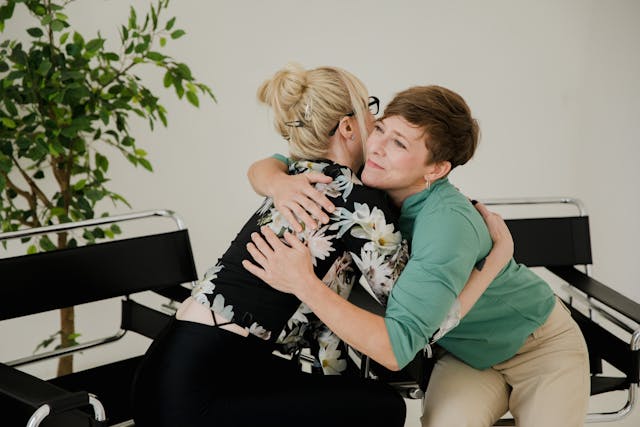8 Effective Communication Skills for Emotional Wellness 💬 [2025 Guide]

In today’s fast-paced world, mastering effective communication skills is not just helpful—it’s essential 🌿. Clear communication helps you build trust, reduce conflicts, and protect your emotional wellness. Whether it’s with your partner, family, or at work, learning to communicate effectively creates a healthier and more balanced emotional life.
Why Emotional Wellness Needs Effective Communication Skills 🤝
Emotional wellness depends on how well you connect with others and express yourself. Without effective communication skills, misunderstandings grow, stress levels rise, and relationships weaken. On the other hand, using the right words, tone, and listening skills can strengthen bonds, reduce anxiety, and build trust. This is why communication is considered the foundation of emotional health.
Read more: 5 Simple Steps to Manage Stress in Your Romantic Relationships (Backed by Psychology)
Let’s Explore 8 Effective Communication Skills 💡
Here are eight powerful skills you can practice every day. Each one is designed to enhance your emotional wellness while helping you build stronger, healthier relationships.
1. Practice Active Listening 👂
One of the most important effective communication skills is active listening. It means giving your full attention to the speaker—no phone, no distractions—just presence. By listening carefully without planning your reply, you make the other person feel valued. This reduces misunderstandings and builds emotional trust.
2. Use “I” Statements Instead of Blame 💬
Conflicts often get worse when we start blaming. Instead of saying “You never listen,” try “I feel ignored when I’m not heard.” This simple switch makes your communication less aggressive and more solution-focused. It’s a small but powerful effective communication skill that reduces defensiveness and promotes emotional balance.
3. Show Empathy and Validate Feelings ❤️
Validation is the heart of empathy. Saying “I understand why you feel upset” shows emotional care. Empathy is a critical communication skill that makes people feel supported. When others feel heard and validated, they are more open, reducing stress for both sides and boosting emotional wellness.
4. Ask Open-Ended Questions ❓
A vital part of effective communication skills is asking open-ended questions. Instead of yes/no answers, ask “How did that make you feel?” or “What do you think will help?” This allows deeper conversations and creates space for honest emotional expression.
5. Be Mindful of Body Language 🧘
Your body language often speaks louder than your words. Smiling, nodding, and leaning forward show interest, while crossing arms or avoiding eye contact can signal rejection. Developing this communication skill helps you create an emotionally safe space, which is vital for healthy connections.
6. Set Healthy Boundaries 🛑
Boundaries are essential for emotional wellness. Being clear about what you need—like saying, “I need a few minutes before discussing this”—is a strong communication skill. Healthy boundaries prevent resentment and emotional burnout while strengthening mutual respect in relationships.
7. Practice Gratitude in Conversations 🌸
Gratitude is one of the simplest but most effective communication skills. Saying “thank you” or recognizing effort builds positivity. Daily gratitude reduces negativity and increases emotional harmony, making your conversations more uplifting and balanced.
8. Pause Before Reacting ⏸️
When emotions are high, the ability to pause is an underrated communication skill. Taking a few seconds—or minutes—before responding helps you avoid harsh words. This creates clarity, lowers stress, and maintains your emotional stability.
Read more: 10 Powerful Ways To Build Trust In Any Relationship
Deep Dive into Effective Communication Skills for Emotional Wellness 🌿
In our fast-paced modern world, conversations are happening everywhere—within families, at work, with friends, and in intimate relationships. Yet, not every conversation produces a healthy outcome. Misunderstandings, arguments, and even mental stress often arise from poor communication. This is why Effective Communication Skills are crucial—not only to build strong relationships but also to maintain emotional wellness.
Understanding the Psychology Behind Communication
Communication is not just about exchanging words. It involves psychology, emotions, and empathy. When someone feels heard and respected, their emotional state becomes positive. For instance, couples who actively practice effective communication skills—such as active listening, avoiding blame, and expressing needs clearly—report higher satisfaction in long-term relationships compared to those who don’t.
The Link Between Emotional Wellness and Communication
Emotional wellness is defined as stability, positivity, and the ability to cope with stress. But what role does communication play here?
- Stress reduction: Clear communication prevents unnecessary conflicts, lowering mental pressure.
- Conflict management: Effective communication allows disagreements to be resolved calmly.
- Bonding: Honest and open conversations strengthen relationships.
In other words, communication is not just about delivering information—it is about maintaining emotional balance.
Barriers That Block Effective Communication
Many people assume that simply speaking equals good communication. In reality, several barriers can prevent success:
- Distractions: Phones, TV, and social media often interrupt meaningful dialogue.
- Assumptions: Jumping to conclusions without listening.
- Emotional triggers: Speaking in anger or sadness can lead to conflict.
- Cultural differences: Misinterpretations often arise from diverse backgrounds.
Recognizing these barriers is the first step toward developing effective communication skills.
Real-Life Examples of Communication in Action
Imagine a workplace scenario where a manager misunderstands your proposal. Reacting defensively might escalate the issue. Instead, calmly saying, “I feel my point wasn’t fully clear, may I explain again?” can resolve tension instantly. Similarly, in relationships, replacing accusatory phrases like “You’re always late” with empathetic statements such as “I feel disappointed when we can’t have dinner together on time” creates understanding rather than conflict.
The Silent Power of Non-Verbal Communication
Words are powerful, but non-verbal cues often speak louder:
- Eye contact signals interest and attentiveness.
- A genuine smile promotes trust and warmth.
- Crossed arms may signal resistance.
- Facial expressions instantly reveal emotional states.
Mastering non-verbal communication strengthens emotional wellness by ensuring that words and body language align.
Effective Communication in Relationships
Relationships thrive on more than love—they need clarity, respect, and consistent dialogue. Core elements include:
- Honesty: Speaking truthfully builds trust.
- Transparency: Avoiding secrecy prevents doubt.
- Respect: Valuing your partner’s voice encourages equality.
- Consistency: Showing daily care creates emotional security.
Studies reveal that over 70% of relational conflicts can be solved by strengthening effective communication skills.
Emotional Intelligence Meets Communication
Emotional intelligence (EQ) plays a critical role in effective communication. By recognizing your own feelings and empathizing with others, you avoid unnecessary conflict. For example, self-awareness stops you from speaking in anger, while empathy helps you understand another person’s pain. Together, EQ and communication create stronger bonds and enhance emotional wellness.
Exercises to Build Effective Communication Skills
Practical steps to enhance skills include:
- Journaling: Reflect daily on what conversations went well and what didn’t.
- Role play: Practice sensitive conversations with a friend.
- Mirror talk: Observe your facial expressions and tone while speaking.
- Silent listening: Dedicate 10 minutes to listen without interrupting.
These exercises gradually sharpen both verbal and non-verbal communication abilities.
Digital Communication in the Modern Age
Today, much of our communication happens online. Whether it’s emails, video calls, or instant messages, the following tips ensure clarity:
- Always proofread before sending messages.
- Use emojis sparingly to add warmth but avoid overuse.
- Be mindful of tone, as digital words often lack emotional depth.
Digital miscommunication can create stress, so mastering this area is essential for emotional wellness.
Read more: 7 Proven Emotional Wellness Tips To Transform Your Relationships
Gratitude as a Communication Tool
Gratitude is one of the most underrated communication strategies:
- Saying thank you at work fosters teamwork.
- Appreciating a partner deepens intimacy.
- Praising family members promotes harmony.
Small words of gratitude carry enormous emotional impact, reinforcing wellness and positivity.
Resolving Conflicts Through Communication
Conflict is natural, but how you handle it defines the outcome:
- Stay calm: Don’t engage while emotions are heated.
- Focus on the issue: Avoid personal attacks and stay on topic.
- Seek win-win: Work toward solutions that satisfy both parties.
These practices not only solve disputes but also protect emotional wellness in the long run.
Long-Term Benefits of Mastering Communication Skills
By practicing effective communication skills consistently, you unlock life-changing benefits:
- Stronger relationships with loved ones and colleagues.
- Lower levels of stress and anxiety.
- Improved self-confidence and self-expression.
- Professional growth and leadership opportunities.
- A more positive, emotionally balanced life.
This is why experts call communication the ultimate life skill.
Expanding Your Mastery of Effective Communication Skills ✨
While we have already explored how communication impacts emotional wellness, there is still more to uncover. Developing Effective Communication Skills is a lifelong process, and each stage of growth adds new depth to how you connect with others. Below, we’ll dive deeper into advanced strategies, hidden benefits, and little-known practices that can transform your personal and professional life. 🌟
The Science of Listening 👂
Most people hear but do not truly listen. Active listening means focusing fully on the speaker’s words, tone, and body language without preparing your own reply in your head. Neuroscience studies show that when someone feels listened to, their brain releases oxytocin—the bonding hormone—which instantly reduces stress and fosters trust. By practicing this simple yet powerful habit, you elevate your effective communication skills and strengthen relationships naturally.
The Role of Storytelling in Communication 📖
Storytelling has been used by humans for centuries to pass down wisdom, culture, and values. Adding personal stories to your conversations makes you more relatable and memorable. Instead of simply saying “I was nervous before the presentation,” you might share the story of how you prepared, what challenges you faced, and how you overcame them. Stories spark emotions, and emotions create lasting connections—an essential aspect of emotional wellness.
Practicing Empathetic Validation 💞
Validation does not mean agreeing with everything someone says—it means acknowledging their feelings. For example, if a friend says, “I feel overwhelmed at work,” instead of responding with advice immediately, you could say, “I understand that must be really stressful for you.” This simple shift reduces defensiveness and opens the door to healthy communication. When used consistently, validation strengthens effective communication skills by making people feel safe and respected.
The Importance of Tone and Delivery 🎤
Words matter, but tone often matters more. The same sentence—“Are you okay?”—can sound supportive, sarcastic, or indifferent depending on delivery. Practicing a calm, steady tone during sensitive conversations ensures your message is received positively. Vocal warmth encourages openness and emotional security, while harsh tones often create distance and conflict. Consciously adjusting tone is one of the most overlooked yet powerful communication skills.
Communicating Boundaries Clearly 🚧
Boundaries are essential for emotional wellness. Saying “no” or “I’m not comfortable with this” does not make you rude; it makes you clear. Boundaries prevent resentment, miscommunication, and emotional burnout. Many people struggle here because they fear rejection. However, communicating boundaries respectfully not only protects your peace but also teaches others how to treat you. Mastering this area is a hallmark of effective communication skills in both personal and professional relationships.
Silence as a Communication Tool 🤫
Sometimes silence says more than words. Pausing before replying gives you time to process emotions and craft thoughtful responses. In heated arguments, silence can act as a reset button, preventing harmful words from being spoken. In presentations, a brief pause emphasizes key points. When used wisely, silence can amplify your effectiveness as a communicator and promote emotional balance.
Cross-Cultural Communication 🌍
We now live in a globalized world where cultural diversity is everywhere. What is polite in one culture may be rude in another. For example, direct eye contact signals confidence in Western societies but may be seen as disrespectful in some Asian cultures. Understanding these nuances improves your adaptability and inclusivity, allowing your effective communication skills to shine in diverse environments.
Handling Difficult Conversations With Grace 💬
Nobody enjoys confronting issues, yet difficult conversations are unavoidable. Whether it’s addressing performance at work or discussing financial struggles at home, the key is preparation. Begin by setting a safe environment, state your perspective calmly, and invite the other person to share theirs. Using phrases like “I respect your view, and here’s mine” prevents escalation. Difficult talks handled gracefully not only solve problems but also strengthen trust.
The Ripple Effect of Positive Language 🌊
Positive language doesn’t mean sugarcoating problems—it means framing conversations in constructive ways. Instead of saying “This will never work,” try “Let’s explore another approach.” Words carry energy, and positive framing inspires solutions instead of resistance. Over time, this habit reshapes your mindset, reduces stress, and uplifts those around you. This is why successful leaders and emotionally intelligent individuals emphasize positive communication.
Harnessing Technology for Better Communication 📱
In today’s digital age, using technology effectively is part of building communication mastery. Tools like video calls, collaboration platforms, and digital journals allow people to stay connected despite physical distance. However, balance is key—face-to-face interactions remain irreplaceable for emotional depth. By combining digital efficiency with human connection, your effective communication skills remain versatile and future-ready.
The Healing Power of Apologies 🙏
A sincere apology can heal emotional wounds faster than any other tool. But not all apologies are equal. Avoid vague statements like “I’m sorry if you felt hurt.” Instead, say “I realize my words hurt you, and I regret speaking that way.” Acknowledging responsibility shows maturity and accountability. Apologies restore emotional balance and strengthen trust, both of which are vital for emotional wellness.
Developing Confidence in Expression 💡
Confidence is not about being loud; it is about being clear. Many people struggle to express needs or opinions because of fear. Practicing clarity, maintaining posture, and speaking slowly can transform your presence. Confidence creates respect, and respect makes others more likely to value your words. Over time, confident communication builds self-esteem and enhances personal growth.
Daily Habits That Strengthen Communication 📝
Like any skill, communication improves with consistent practice. Some powerful daily habits include:
- Writing down one positive interaction daily to reflect on progress.
- Practicing gratitude by sending short messages of appreciation.
- Taking 5 minutes each night to review conversations mentally.
- Setting intentions before entering important discussions.
These small habits accumulate into lasting mastery over effective communication skills.
Future Trends in Communication 🚀
As society evolves, so does communication. Virtual reality meetings, AI-powered translation, and emotional recognition tools are shaping how people interact. Yet, one truth will always remain: genuine empathy, respect, and human connection cannot be replaced by technology. The individuals who continue to refine their effective communication skills will thrive in this changing landscape.
Frequently Asked Questions (FAQs) ❓
Why are effective communication skills important for emotional wellness?
Effective communication skills help reduce misunderstandings, build stronger relationships, and support emotional wellness by allowing people to express themselves clearly.
How can I develop these skills for daily conversations?
By practicing active listening, showing empathy, and speaking with clarity, you can improve effective communication skills that support your emotional wellness.
What is the fastest way to improve communication skills?
The fastest way is to practice mindful communication—listen without judgment, respond with empathy, and express gratitude daily.
Final Thoughts 🌟

Mastering effective communication skills is the key to building stronger relationships, reducing stress, and maintaining emotional wellness. Each skill—whether it’s active listening, empathy, or setting boundaries—can transform your connections and bring peace of mind. Start small, practice consistently, and watch your emotional wellness flourish 🌿.
For more insights on mindfulness and wellness, you can explore this helpful resource:
Psychology Today.
Also, you may check out this article for additional lifestyle tips:
Healthline.



Pingback: Top 9 Powerful Emotional Healing Affirmations for Inner Peace